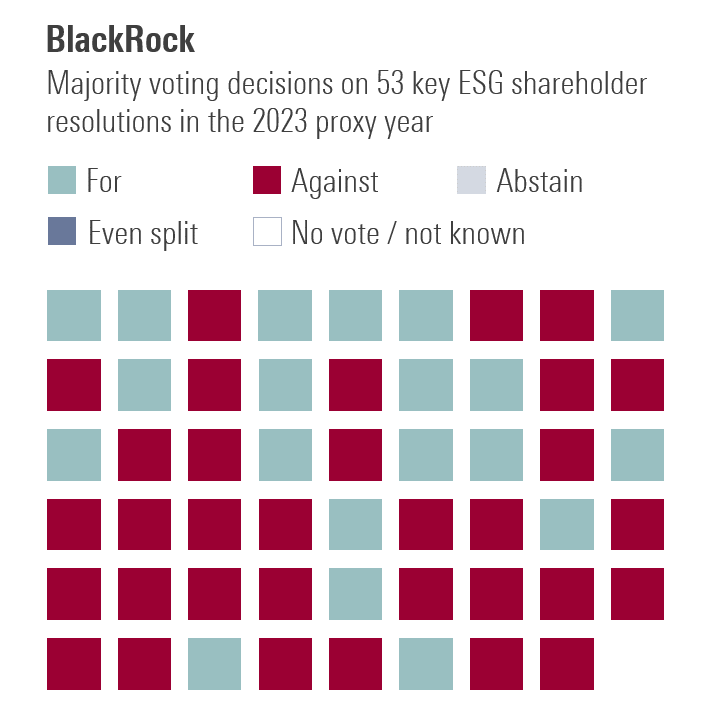Proxy Advisors Have Too Much Power, Says Elon Musk. Is He Right?
Here’s what investors should know about the role of proxy advisors.

Elon Musk isn’t happy.
Elon Musk, the CEO and 13% shareholder of Tesla TSLA, is petitioning the company’s board to grant him more voting power over the electric vehicle maker, according to a recent article in The Wall Street Journal.
Just for context, Musk sold a chunk of Tesla stock to fund his takeover of Twitter. A conventional reading of the matter would be to say if Musk wanted greater control of Tesla, then he perhaps shouldn’t have sold quite so much stock. But there never was anything conventional about Elon Musk. His aim is to ward off the “activists that basically infiltrate those organizations and have strange ideas about what should be done.”
“Those organizations” are proxy advisors, which provide research and voting recommendations about the resolutions that shareholders vote on at company meetings. For more about proxy voting, read this. But little is understood about the proxy advisory business, which is led by the firms ISS and Glass Lewis. (Morningstar Sustainalytics also offers voting recommendations through its ESG Voting Policy Overlay service.)
Musk tweeted:
ISS and Glass Lewis have strongly refuted claims like these, which arise frequently. Morningstar researchers have also looked closely at this topic.
As the proxy season gets going, this article seeks to answer three important questions: Who are the proxy advisors? What do they do? And how does that affect your investments?
Proxy Advisors: Who They Are and What They Do
In the proxy document that precedes every annual meeting, investors usually encounter a raft of proposals made by independent shareholders aiming to improve transparency around how a company does business and manages risk. Proxy advisors help fund managers and other institutional investors decide how to vote on these shareholder resolutions. ISS and Glass Lewis, the market leaders, control over 90% of the proxy advisory market, so their recommendations do matter.
There are thousands of companies with hundreds of thousands of resolutions to be voted on. Proxy advisors are an important part of the governance system in public markets. They allow managers to focus on the most important voting issues, and to use proxy advisors’ recommendations to make decisions on more routine matters.
So, does that mean key issues at companies are decided by proxy advisors, not shareholders?
In short, no.
Proxy Advisors Advise, Fund Managers Decide. Here’s the Evidence.
If managers were “outsourcing shareholder voting decisions” to proxy advisors, as Musk claims, then they would make similar decisions. Morningstar found otherwise. Morningstar’s proxy-voting research demonstrates that the opposite is true—asset managers’ votes on environmental, social, and governance proposals have become less correlated over the past few years.
So how do asset managers vote on governance and sustainability issues? The answer is that proxy advisors advise, and managers decide. There are a few reasons why we can say this so categorically.
First, most asset managers have their own tailor-made policies for proxy voting, engagement, and ESG integration. These policies have varying degrees of specificity on how the manager may vote on various ESG issues. The issue is complicated by the differing practices of each firm. Depending on the firm, the voting decision-maker can vary—sometimes it’s the portfolio manager, sometimes a stewardship specialist, and in some contentious cases a senior-level committee will decide. Also, the degree of freedom given to voting decision-makers at each firm to make case-by-case decisions also varies.
Overall, there is a wide range of influencing factors and decision-makers that result in managers making different decisions on the same proxy-voting issues.
So, are managers simply copy-and-pasting proxy advisors’ voting recommendations? The data shows that the opposite is true.
A 2015 study by Proxy Insight indicated that over 70% of asset managers use their own bespoke policy rather than the standard policy of a proxy advisor (known as a benchmark policy). A more recent study in April 2023 published by the Financial Reporting Council, a U.K. regulator, indicated that the figure hasn’t changed much. According to that research, 75% of institutional investors use proxy advisor recommendations tailored to their bespoke voting policy instead of the benchmark policy.
Morningstar’s research reveals similar findings. We analyzed managers’ voting decisions on key ESG resolutions at U.S. companies. (We define key resolutions as shareholder proposals supported by at least 40% of a company’s independent shareholders.)
Asset managers make very different decisions on ESG topics. Looking at the Big Three index managers, for example, we found that BlackRock and State Street supported over half of 227 key resolutions at U.S. companies in the last three proxy-voting years (51% and 65% of their fund votes, respectively). Vanguard’s support for these resolutions was around half that of its Big Three peers over the same period (28%). Looking only at the most recent year, the differences are even more stark: 66% of State Street’s fund votes on key ESG resolutions were cast in support of them, compared with 37% at BlackRock and just 9% at Vanguard.
Spot the Difference
You can see the point more starkly in this graphic of how the top 10 managers of U.S. equity funds voted on the 53 key resolutions in the 2023 proxy year.
Key ESG Resolutions 2023: Top 10 Managers' Voting Decisions

The clear differences in the number of red and green squares for each manager make it visually obvious that the top U.S. managers are not simply rubber-stamping the recommendations of the leading proxy advisors. If they were, these graphics would look much more similar to each other than they do.
For example, while Invesco and Franklin Templeton supported most of these key resolutions, Vanguard, T. Rowe Price, and Dimensional opposed most of them. BlackRock, Fidelity, Capital Group, and J.P. Morgan all fall somewhere in the middle. Meanwhile, State Street uses the “Abstain” option much more frequently than other managers. (Read more Morningstar analysis of proxy voting here.)
These differences can even appear within a single fund firm when the firm employs subadvisors. For example, Geode—a subsidiary of Fidelity that subadvises Fidelity’s index funds—is a more frequent supporter of key ESG resolutions compared with its parent. Similarly, Wellington, subadvisor to some of the largest Vanguard funds, also supports key ESG resolutions more frequently than the Vanguard-advised funds.
These clear differences in approach are why we frequently emphasize the need for investors to assess their manager’s stance on social and environmental issues. That way, investors can ensure that their manager’s engagement and voting efforts are well-aligned with their own values and priorities.
A Growing Role for Proxy Advisors in the Future
Notably, BlackRock, State Street, and Vanguard are all rolling out proxy-voting choices to more of their clients this year. (Some also call this “pass-through voting.”)
This means a growing number of investors will have the option to select a voting policy that reflects their own ESG priorities or to continue to rely on the asset manager’s discretion. Investors will only be allowed to select a policy they prefer, rather than request specific voting decisions on the resolutions at each company’s shareholder meeting. But these policy options allow investors to express broader voting preferences on key themes like board appointments or ESG shareholder resolutions, and the policies are mostly written by proxy advisors.
So, the role of proxy advisors looks set to keep growing, with an even greater emphasis on investor preferences than before.
All in all, it’s never been more important to assess what your ESG priorities are as an investor and take steps to ensure that your views are represented.
The author or authors do not own shares in any securities mentioned in this article. Find out about Morningstar’s editorial policies.

/s3.amazonaws.com/arc-authors/morningstar/20726617-027d-4959-87ab-429b60ece7ce.jpg)
/cloudfront-us-east-1.images.arcpublishing.com/morningstar/NNGJ3G4COBBN5NSKSKMWOVYSMA.png)
/cloudfront-us-east-1.images.arcpublishing.com/morningstar/6BCTH5O2DVGYHBA4UDPCFNXA7M.png)
/cloudfront-us-east-1.images.arcpublishing.com/morningstar/EBTIDAIWWBBUZKXEEGCDYHQFDU.png)
:quality(80)/s3.amazonaws.com/arc-authors/morningstar/20726617-027d-4959-87ab-429b60ece7ce.jpg)